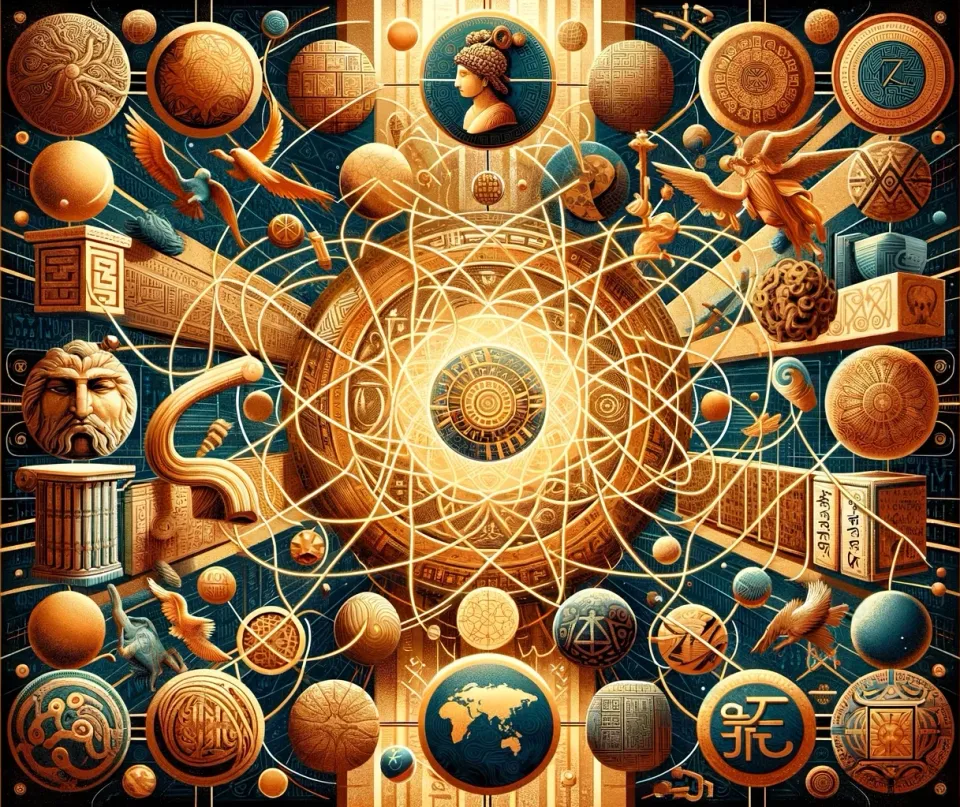A Unified Beginning: Understanding Our Shared Roots

We explore how the ancient principle of common origin can inform and transform contemporary education and unveil how these insights are applied to create a learning landscape that is adaptive, equitable, and honor the respect within one another that fuels the confidence that drives education.
Unraveling the Improbable: Our Shared Human Story
The notion that we humans, universally, originate from a singular source is not merely a philosophical ideal but is supported by a confluence of evidential streams from literature, anthropology, and global cultural practices such as with solar calendars.
The history and adoption of the solar calendar across civilizations—from Alkabulan/Africa, the Julian to the Persian, Hindu, Ethiopian, Japanese, Korean, and many others—is a testament to our shared intellectual heritage. The probability of disparate societies coincidentally creating such similar systems of time measurement supports the notion of a shared ancient knowledge base, rather than isolated development.
Homer: The Earliest Western Writer
Be it Homer, Hesiod, or Aesop, there is no doubt these figures stretch to the earliest known writings in the Western tradition. These authors are intimately familiar with the concept of a "Golden Age" in Greek mythology, which they and other ancient Greek writers referenced extensively. This Golden Age, depicted as an idyllic time when humans lived in peace and harmony, free from suffering and hardship, reflects a narrative of profound unity—suggesting that humans were not only more connected but shared a commonality that transcended individual cultures.
Modern anthropology supports this narrative through an established theory of migration from a common source. This theory posits that all modern humans originated from Africa, and is supported by robust genetic and fossil evidence which illustrates how humans spread from Africa to other parts of the world. This migration narrative reinforces the idea of a once unified human group, expanding outwards, yet maintaining intrinsic links that echo the cooperative spirit of the mythical Golden Age.
It's important, for thoroughness, to note that while the continent is now known as Africa, the name "Alkebulan" is believed to be one of the oldest for the region, said to have been used by indigenous peoples and meaning "mother of mankind" or "garden of Eden" in some interpretations.
Altogether, the notion of the "Golden Age" and the rigorous works in anthropology over the last century and a half robustly support the concept of a common origin. This truly is a beautiful theory—it asserts that our differences are superficial while our commonalities run deep. Under this framework, the concept of time, should it exist, compresses to transform a stranger into a familiar face, regardless of their origin, language, and culture.
Most importantly, common origin fosters a profound respect, establishing each child and young adult as a peer endowed with their own inalienable potential to learn, succeed, and thrive. By embracing this understanding, we pave the way for an educational system that acknowledges and nurtures the deep-rooted capabilities of every learner.
The Mathematics of Commonality: Supporting the Theory of Common Origin
Mathematically, the probability of multiple societies coincidentally developing nearly identical systems to measure and understand time, without any shared influence, is exceedingly low. This is where principles from probability theory and differential equations come into play. These fields allow us to model complex phenomena and assess the likelihood of independent events occurring simultaneously across different geographic and cultural landscapes.
For instance, applying the principle of probability, if the chance of developing a complex calendar system like the solar calendar is low for one civilization (say 1 in 100), the simultaneous independent invention of similar systems by multiple civilizations diminishes exponentially with each additional civilization. This statistical improbability supports the hypothesis that there was a common knowledge base or shared influence, echoing the common origin theory.
Additionally, differential equations, which are used to model systems that change over time, suggest that cultural and technological evolutions are not isolated incidents but are influenced by prior states—potentially shared origins. Thus, when viewed through the lens of mathematics, the scattered pieces of human history and development converge, suggesting a pattern that points to a singular, shared beginning.
Implications for Modern Education: Building Confidence Through Education
If we accept the premise of a common origin, bolstered by the improbability of independent yet identical conclusions in calendar systems and other cultural artifacts, we must also reconsider our educational paradigms. Today’s educational challenges are vastly different from those of the past, influenced by technological advancements and shifts in societal structure. Understanding our common origins reinforces the idea that there is no inherent inability among groups to achieve success in modern education. Instead, it suggests that it is the educational systems that need to evolve.
The principle of common origin speaks directly to the potential within each human being. Recognizing that the distribution of potential across populations is relatively equal provides a powerful foundation for building confidence among learners. It challenges the outdated notions that some groups are inherently less capable of achieving educational success. By emphasizing our shared origins, we can foster an educational environment that nurtures confidence and emphasizes equity.